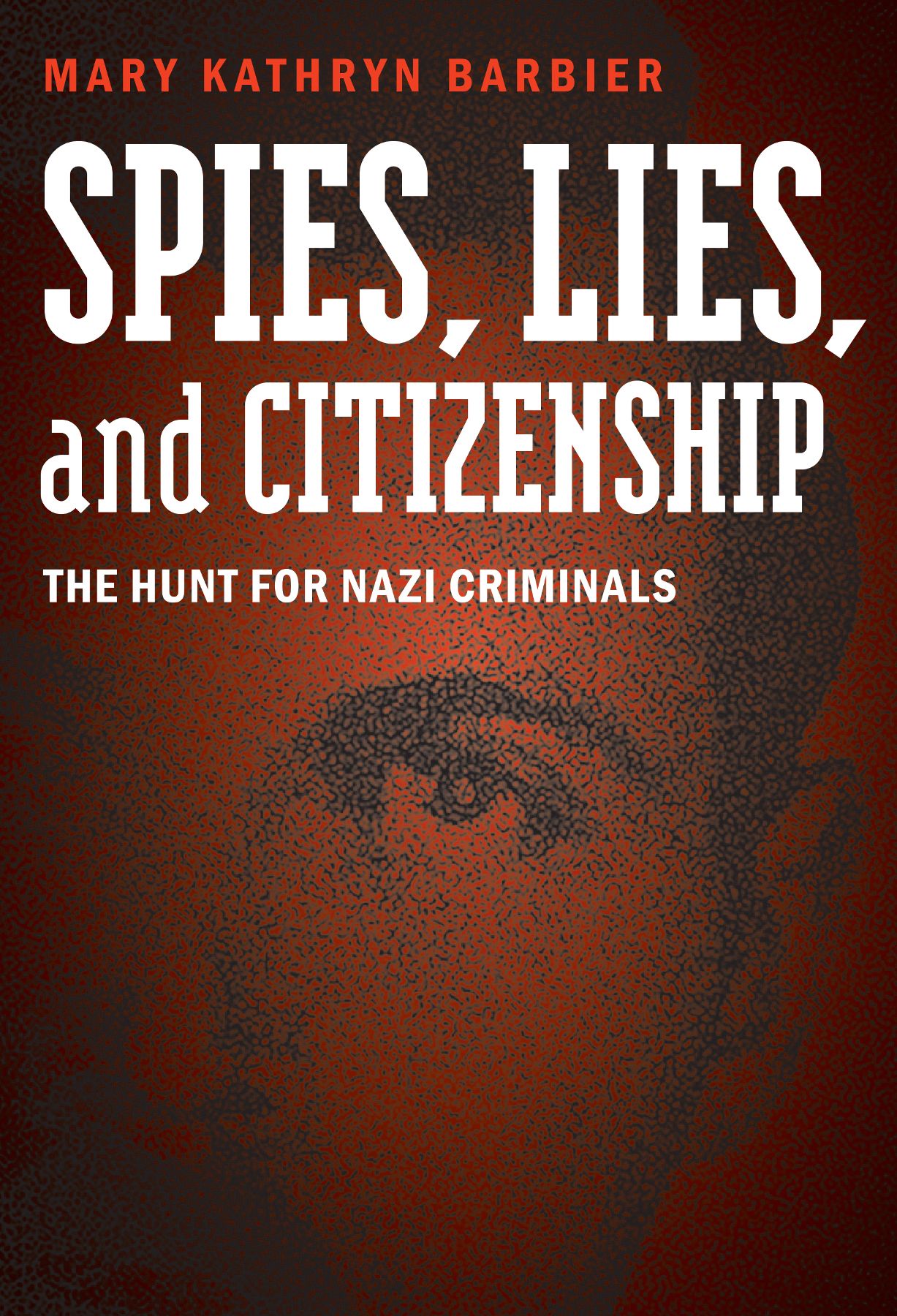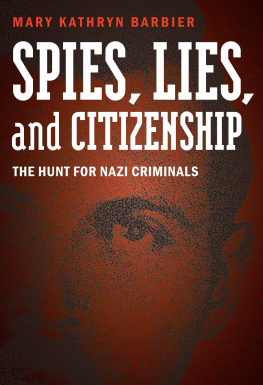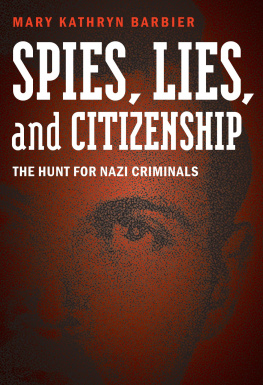Mary Kathryn Barbier - Spies, Lies, and Citizenship: The Hunt for Nazi Criminals
Here you can read online Mary Kathryn Barbier - Spies, Lies, and Citizenship: The Hunt for Nazi Criminals full text of the book (entire story) in english for free. Download pdf and epub, get meaning, cover and reviews about this ebook. year: 2017, publisher: Potomac Books, genre: Politics. Description of the work, (preface) as well as reviews are available. Best literature library LitArk.com created for fans of good reading and offers a wide selection of genres:
Romance novel
Science fiction
Adventure
Detective
Science
History
Home and family
Prose
Art
Politics
Computer
Non-fiction
Religion
Business
Children
Humor
Choose a favorite category and find really read worthwhile books. Enjoy immersion in the world of imagination, feel the emotions of the characters or learn something new for yourself, make an fascinating discovery.
- Book:Spies, Lies, and Citizenship: The Hunt for Nazi Criminals
- Author:
- Publisher:Potomac Books
- Genre:
- Year:2017
- Rating:5 / 5
- Favourites:Add to favourites
- Your mark:
- 100
- 1
- 2
- 3
- 4
- 5
Spies, Lies, and Citizenship: The Hunt for Nazi Criminals: summary, description and annotation
We offer to read an annotation, description, summary or preface (depends on what the author of the book "Spies, Lies, and Citizenship: The Hunt for Nazi Criminals" wrote himself). If you haven't found the necessary information about the book — write in the comments, we will try to find it.
Spies, Lies, and Citizenship: The Hunt for Nazi Criminals — read online for free the complete book (whole text) full work
Below is the text of the book, divided by pages. System saving the place of the last page read, allows you to conveniently read the book "Spies, Lies, and Citizenship: The Hunt for Nazi Criminals" online for free, without having to search again every time where you left off. Put a bookmark, and you can go to the page where you finished reading at any time.
Font size:
Interval:
Bookmark:

A cautionary tale of how the immediate quest for power trumps conventional morality every time.
Marc Milner, professor of history at University of New Brunswick and director of the Brigadier Milton F. Gregg Centre for the Study of War and Society
A fascinating look into the world of Nazi criminals and the organizations that pursued themsometimes effectively and sometimes not.
Geoffrey Megargee, author of War of Annihilation: Combat and Genocide on the Eastern Front, 1941
A compelling story of the difficulties in rendering justice after the Second World War.... Spies, Lies, and Citizenship tells a disturbing story that focuses on the ambiguity surrounding the legacy of the Good War that allowed some perpetrators of war crimes to escape justice. It is also an account of determined investigators in the U.S. Department of Justice committed to sniffing out these criminals and deporting them from American shores.
G. Kurt Piehler, director of the Institute on World War II and the Human Experience at Florida State University
Mary Kathryn Barbier
Foreword by Dennis Showalter
Potomac Books
An imprint of the University of Nebraska Press
2017 by the Board of Regents of the University of Nebraska
Cover designed by University of Nebraska Press; cover image is made from an interior image from the public domain.
Author photo by Russ Houston, Mississippi State University.
All rights reserved. Potomac Books is an imprint of the University of Nebraska Press.
Library of Congress Control Number: 2017947015
The publisher does not have any control over and does not assume any responsibility for author or third-party websites or their content.
French novelist and philosopher George Bernanos once defined realism as the good sense of bastards. That cynical phrase seldom finds more frequent application than in accounts of one of the greatest surprises after World War II: the revelation that literally thousands of former Nazis had not only escaped punishment for their crimes but were living peacefully and prosperously in the United States under the sponsorship and protection of various government agencies, with their files comprehensively sanitized. Not only that, but hundreds of others, now relocated to Germany, were receiving social security payments!
On one level Americans should have been little more surprised than Casablancas police chief, who is shocked to learn that gambling is going on in Ricks American Bar. German scientists and technicians had been high-profile figures in the U.S. space program from its inception. The West German Bundeswehr initially depended heavily at all levels on Wehrmacht veterans. American occupiers found it impossible to administer their conquest effectively without at least tacit cooperation from locals whose recent pasts were unlikely to withstand close questioning. But there was the Fulda Gap to screen, Europe to rebuild, and a Cold War to wage.
By the 1970s, however, times were changing. The Cold War seemed little more than a ritualized game played by the rules of John le Carr. A quarter century of research and memory had exposed the Third Reich as a comprehensive experience that had left good Germans thin on the ground. Under growing public and congressional pressure in 1979, the Office of Special Investigations was established in the Department of Justice. Its mission was to find and prosecute war criminals living in the United States, and it had comprehensive powers of investigation, litigation, and negotiation.
Most accounts use this as the framework for an international detective storysucceeding or failing depending on the authors perspective. Prof. Mary Kathryn Barbier has mined printed and archival sources from a fresh perspective. Using case studies ranging from near anonymous figures to familiar names like Josef Mengele and Kurt Waldheim, Barbier demonstrates and unravels the complexity both of the unique origins of each situation and the problems a democracy faces when investigating crimes backward: starting with the offender and seeking the offenses.
Arguably, Professor Barbiers major contribution to the story of the hunt for Nazi Germanys second-string criminals is her sophisticated analyses of their characters and careers. Those who achieved enough to interest American recruiters were uniformly cunning, connectedand unscrupulous. All three were requisites for securing and maintaining ones position on the slippery poles of power in the Third Reich. Some, like Klaus Barbie, had a fingertip sense of when and where to report himself ready to serve new masters. Some, like Mengele, depended on friends and family. Others, like ex-Wehrmacht lieutenant Kurt Waldheim, burrowed into emerging political systemsin his case Austriasand developed carapaces against awkward questions, especially those raised by foreigners. It is no disrespect to their American opposite numbers to say the Germans were often able to play them like gaffed fish.
Circumstances disproportionately favored the survivors of the broken Reich. The challenge began with the greatest surprise that the postwar U.S. security system faced: the outbreak of the Cold War. Until as late as 1944, Britain had been considered, especially by the armed services, as Americas primary postwar antagonist and competitor. Files on the Soviet Union were correspondingly episodic, and emergency measures seldom create coherent systems. The United States was beginning from scratch, and from a dozen start lines.
The problem of who to let in and who to shut out was further exacerbated by the sheer chaos of postwar Germany. Records were destroyed; people were scattered at random. Basic administrative With the Reich destroyed and its leaders facing trial for their lives, it required some imagination to conceive of what autonomous harm this human flotsam, bought and paid for with U.S. dollars, could generate in any case. And if it took prevarication here and there to evade President Harry Trumans ban on importing deeply involved Naziswell, some lies can be noble lies.
All seemed well, with files left to molder, secrets mutually kept, and the dead left to bury the deaduntil the creation of the Office of Special Investigations. Yet as Barbier shows, the wide-ranging powers granted to the OSI in theory proved far less sweeping in practice. Agencies competing for funding and influence shouldered the newcomer to the margin whenever possible. Immigration laws and regulations limited effective domestic sanctions to deprivation of citizenship and deportationthe Constructions ex post facto clause forbade prosecution for war crimes. And even those sentences were subject to a complicated appeals system favoring the defendant. Internationally, extradition treaties were a continuing obstacle, especially in Latin America, where enforcing their terms was a useful way to assert freedom from American control. Actuarial statistics also complicated investigations. More and more of the designated targets were dying off. Too many of the remainder had been low-ranking, menial, or marginal participants, whose advanced age could generate not necessarily sympathy but a question whether in such cases the quest was for justice or vengeance. And from the beginning the OSI was challenged for working too closely with Jewish organizations having similar objectives and with the USSR to obtain information whose accuracy was often dubious.
In 2010 the OSI was merged into a new Human Rights and Special Prosecutions Section, with what amounts to a global mandate. Statistically, its record was arguably unimpressive: around a hundred deportations all told. But it was by far the most persistent, the most systematic, and the most successful of any of the national or international organizations, outside of Israel, at exposing and at least partially cleaning up a particularly noxious legacy of Adolf Hitlers world.
Font size:
Interval:
Bookmark:
Similar books «Spies, Lies, and Citizenship: The Hunt for Nazi Criminals»
Look at similar books to Spies, Lies, and Citizenship: The Hunt for Nazi Criminals. We have selected literature similar in name and meaning in the hope of providing readers with more options to find new, interesting, not yet read works.
Discussion, reviews of the book Spies, Lies, and Citizenship: The Hunt for Nazi Criminals and just readers' own opinions. Leave your comments, write what you think about the work, its meaning or the main characters. Specify what exactly you liked and what you didn't like, and why you think so.









